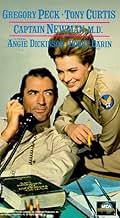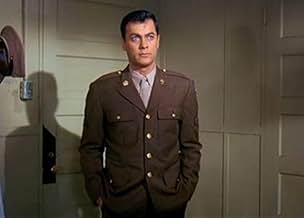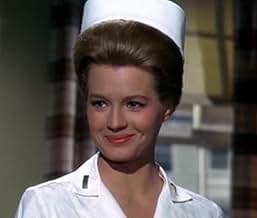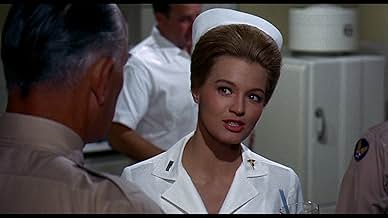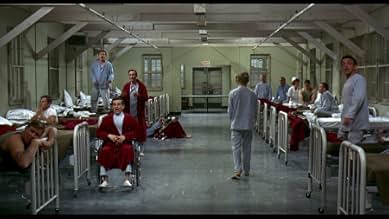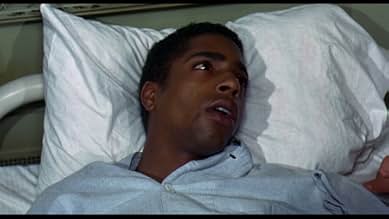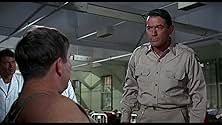Em 1944, um médico do exército é responsável por uma ala neuropsiquiátrica em um hospital do Corpo de Aviação do Exército, no Arizona, e precisa lidar com uma variedade de casos difíceis.Em 1944, um médico do exército é responsável por uma ala neuropsiquiátrica em um hospital do Corpo de Aviação do Exército, no Arizona, e precisa lidar com uma variedade de casos difíceis.Em 1944, um médico do exército é responsável por uma ala neuropsiquiátrica em um hospital do Corpo de Aviação do Exército, no Arizona, e precisa lidar com uma variedade de casos difíceis.
- Direção
- Roteiristas
- Artistas
- Indicado a 3 Oscars
- 10 indicações no total
- Gorkow
- (as Charles Briggs)
Avaliações em destaque
Peck is an officer running a psychiatric ward stateside during WWII. He has a good heart and good intentions and tries a lot of different techniques to help these men. What I like is that although he is generally successful, it is very clear Captain Newman feels, at times, over his head dealing with these many patients. He is not a SUPERMAN but a decent guy who's trying his best.
Tony Curtis is the comic relief. So, while the movie is VERY serious at times, it also can be rather comical. This is a tough balance but it is done well and I liked Curtis in this film.
However, apart from Gregory Peck, the real standout in the movie is Bobby Darin. Although he only is a supporting player, his is the meatiest performance. He wonderfully plays a man suffering from Post-Traumatic Stress Disorder (though he outwardly hides it with bravado and obnoxiousness)--this is particularly true when he is under the influence of Sodium Pentathol (or some other "truth serum"). I would say it is worth seeing the film just for this sequence--it's just so nice that there are many other good moments to recommend this flick.
*On a side note, given the fact that this movie--from my perspective--seems to be somewhat ahead of its time in subject matter, directing style in some of the scenes, and even some concepts not too common during the 60s, it's interesting to point out that the movie still portrays the classical female role in life. There is one line that is spoken by Lt. Francie Corum that shows this perfectly. The line doesn't seem to be necessary and doesn't really fit with what the characters are discussing. I won't tell you the line, but try to find it for some fun.
The military is resistant to Newman and his views on PTSD. He is challenged at every turn. The movie itself was probably at the cutting edge in 1963. The movie was filmed 10 years after the end of the Korean war, and that usually is when the Hollywood reflection movies start to be made. The acting is still movie versions of crazy in today's terms. But it was probably a good improvement on a realistic look at mental illness at the time.
Você sabia?
- CuriosidadesAuthor Leo Rosten based the character of Captain Josiah Newman on his friend, Captain Ralph Greenson, a U.S. Army psychiatrist who worked with traumatized airmen during World War II, and was one of the first to identify the symptoms of Post-Traumatic Stress Disorder following combat.
- Erros de gravaçãoEven though the story is taking place in 1944, hairstyles, uniforms and clothes are from 1963.
- Citações
Capt. Josiah J. Newman, MD: You mustn't confuse sadness with depression, "professor."
Cpl. Jackson 'Jake' Leibowitz: Is there any difference? Can a man look sad and still be happy?
Capt. Josiah J. Newman, MD: Yes.
Cpl. Jackson 'Jake' Leibowitz: Example?
- ConexõesFeatured in Biografias: Bobby Darin: I Want to Be a Legend (2001)
- Trilhas sonorasJingle Bells
Written by James Pierpont (uncredited)
Performed by Tony Curtis and the people from the Hospital
Principais escolhas
- How long is Captain Newman, M.D.?Fornecido pela Alexa
Detalhes
- Data de lançamento
- País de origem
- Idiomas
- Também conhecido como
- Pavilhão Sete
- Locações de filme
- Empresas de produção
- Consulte mais créditos da empresa na IMDbPro
- Tempo de duração2 horas 6 minutos
- Cor
- Proporção
- 1.85 : 1
Contribua para esta página



